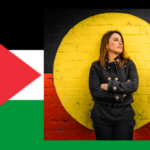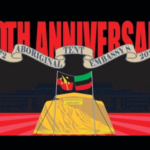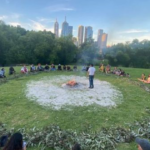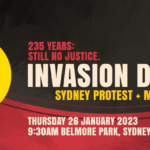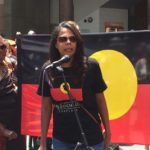Blocking Genocide Prosecutions to Maintain Sovereignty Is the Australian Way

Krauatungalung elder Uncle Robbie Thorpe lodged a private criminal prosecution with the Magistrates’ Court of Victoria against attorney general Mark Dreyfus, with the charge sheet outlining that over the chief lawmaker’s time in parliament, he’s failed to “stop and prevent the ongoing Aboriginal genocide”.
If the Magistrate’s Court accepts the charge sheet, Dreyfus will stand charged with genocide by inflicting destructive life conditions, contrary to section 268.5 of the Criminal Code Act 1995 (Cth), which is an offence that carries life imprisonment.
The difficulty with this case making it to the Victorian Supreme Court is that to prosecute any of the five types of genocide offences that appear in Australian domestic law, the attorney general’s written consent for such proceedings to commence is required, under section 268.121 of the Criminal Code.
This provision is referred to as the attorney general’s fiat, and, as Thorpe points out, it acts as a barrier for the First Peoples of this continent attempting to seek justice in regard to genocide. And to top it off, section 268.122 of the Code ensures that the AG’s decision is firm: it cannot by challenged.
The interest regarding the attorney’s fiat that applies not only to genocide crimes, but also war crimes and crimes against humanity has risen this year, in the context of Israel’s mass slaughter of Palestinians in Gaza.
And in response, Senator Lidia Thorpe is progressing a bill through parliament that would resolve this injustice.
“Intends to destroy, in whole or in part”
According to the 24 July charge and summons sheet filed against the attorney general, Uncle Robbie Thorpe alleges that Dreyfus has been perpetrating the offence of genocide by inflicting destructive life conditions on Aboriginal people during his whole time in office, from 2007 onwards.
Dreyfus’ alleged criminality includes failing to recognise the unceded sovereignty of First Peoples, failing to seek their consent to the occupation of their lands, and he hasn’t sought any advisory opinion from the International Court of Justice on whether Australia has any jurisdiction over them.
This is Dreyfus’ second stint as AG. This time it commenced in May 2022 and prior to that he was chief lawmaker for seven months in 2013, and section 268.121 has been active over that time, yet he’s made no attempt to remove this law, which blocks genocide cases in general without approval.
Thorpe makes the point that in preventing Aboriginal people from prosecuting genocide in Australian law courts, via the AG’s fiat, which is always in the hands of a white Australian, not only does it stop a particular case, but it knowingly perpetuates ongoing genocide on this continent.
“In your powerful position as first law officer of the Commonwealth of Australia you have deliberately and knowingly failed and refused to fully completely and properly implement and legislate” the 2002 Rome Statute and the 1948 Genocide Convention in local law, asserts Thorpe.
Howard positioned the block
The Rome Statute of the International Criminal Court came into effect on 1 July 2002. It initially enacted three of the four core international criminal offences of genocide, war crimes and crimes against humanity, and it created the ICC: a global court to prosecute individuals for these crimes.
The Howard government ratified the treaty at the time, which made Australia a party to the court, and it also required the government to enact these same criminal offences in federal domestic law, so they can be prosecuted in Australia, without requiring to take the matter to the ICC.
Passed that same year, the International Court Act 2002 (Cth) established the ICC jurisdiction in Australia, while a bill of consequential amendments inserted the multiple forms of the three core international crimes into the Criminal Code Act 1995 (Cth), under division 268.
The atrocity laws are unique as they’re supposed to permit the prosecution of these offences in Australian courts. And they carry universal jurisdiction, which means any person who commits an atrocity anywhere on the planet can be charged locally and prosecuted here under these laws.
However, this was then PM Howard enacting these offences, and he was well aware of the potential for these laws to be used locally due to the ongoing genocide/s taking place on this continent. So, the crafty devil and his cohorts, drafted and inserted the AG fiat, which means it’s all up to one minister.
The attorney general’s fiat has been applied twice: once by then AG Christian Porter to refuse an atrocity case against then Myanmar state counsellor Aung San Suu Kyi in 2018, and firstly, by then AG Robert McCelland in 2011, to prevent the trialling of Sri Lankan PM Mahinda Rajapaksa.
The one measure relating to the division 268 atrocity offences that falls outside of the scope of Australian government control is that if an individual can prove that such a case is impossible to prosecute in their local jurisdiction, they can go directly to the International Criminal Court to do so.
And that’s what Uncle Robbie told Sydney Criminal Lawyers that he’s up to at present.
“It’s always been the case. We’re not going to see justice in this country. It’s the system that is the criminal here,” Thorpe explained. “So, we’re angling toward the international court the whole time.”
Palestinian-centred cases on hold
The possibility of bringing genocide cases before the courts hit fever pitch in February this year, after foreign minister Penny Wong cut aid to UNRWA, then the chief aid channel into the Gaza genocide site, in late January, which actually made this nation one of the first to follow the US in doing this.
The proposal of launching a local genocide case against key Labor political figures, such as Wong, defence minister Richard Marles or even PM Anthony Albanese, were all being flagged at that time, in respect of their support for the Israeli perpetrated genocide upon the Palestinians of Gaza.
Yet, these suggestions raise another issue with the AG’s fiat and that is, Dreyfus is a known Zionist, which, would suggest that he’d be less inclined to greenlight a case that involved an attempt to prosecute an Israeli official in relation to atrocities against Palestinians .
And in the current climate, it’s best to underscore that this issue has nothing to do with the AG being Jewish, as most people understand numerous Jews oppose the Gaza genocide. But it rather has to do with his support for Israel, his shielding it from criticism and his appearances at Zionist rallies of late.
Leveling the playing field
And in the midst of the outcry about the Gaza genocide in February, Senator Lidia Thorpe introduced the Criminal Code Amendment (Genocide, Crimes Against Humanity and War Crimes) Bill 2024, which seeks to ensure that the AG’s signoff will no longer be required to progress a genocide case.
“These changes facilitate truth telling and accountability, without which, there will be no change,” explained the Gunnai Gunditjmara and Djab Wurrung senator, during her second reading speech on the Genocide Bill.
“Unless governments commit and choose to be held, and hold others accountable, crimes against humanity, genocide, war crimes, suffering and mass death will happen again, over and over again,” she said, adding that countless studies suggest why Australia may be avoiding such prosecutions.
The Genocide Bill has been sent to the Senate Legal and Constitutional Affairs Legislation Committee to undergo review, and while the deadline for submissions is this Friday, often exceptions can be made for documents arriving a little late. And the committee is to report back this November.
“No politician should get to say who can and can’t be held accountable in our legal system, particularly in relation to the most heinous crimes, like genocide,” Senator Thorpe said in concluding her speech.
“Whether you’re a Palestinian Australian who has seen your family murdered in Gaza, or a Blak mother wanting to hold this government to account for the ongoing removal of First Nations children, my bill will give people in this country a better chance for justice.”


